Analysis of Knowledge Management Systems at the World Bank
VerifiedAdded on 2023/06/11
|10
|2477
|92
Report
AI Summary
This report evaluates the World Bank's utilization of knowledge management systems, focusing on data capture, management, and usage, while also addressing the ethical and legal considerations associated with data collection. It identifies the World Bank's goals, including leveraging information technology to combat poverty and disease, and highlights the challenges in knowledge sharing, particularly tacit knowledge. The report explores data capture methods, emphasizing the importance of adapting strategies based on the data source and distinguishing between tacit and explicit knowledge. It further examines strategies for capturing tacit knowledge, such as collaboration, social networks, and reinvention, and recommends fostering a non-aggressive environment to encourage knowledge sharing. The report also assesses the World Bank's initiatives, including customer relationship management, and proposes key recommendations for enhancing the KM system, such as establishing a knowledge-sharing culture and prioritizing knowledge formation to address ethical and legal issues. The report concludes by emphasizing the need for updated systems that cater to all member states, particularly in poverty and disease eradication.

Knowledge Management System 1
KNOWLEDGE MANAGEMENT SYSTEM
Name:
Course:
Professor:
Academic Institution:
City/State:
Date:
KNOWLEDGE MANAGEMENT SYSTEM
Name:
Course:
Professor:
Academic Institution:
City/State:
Date:
Paraphrase This Document
Need a fresh take? Get an instant paraphrase of this document with our AI Paraphraser
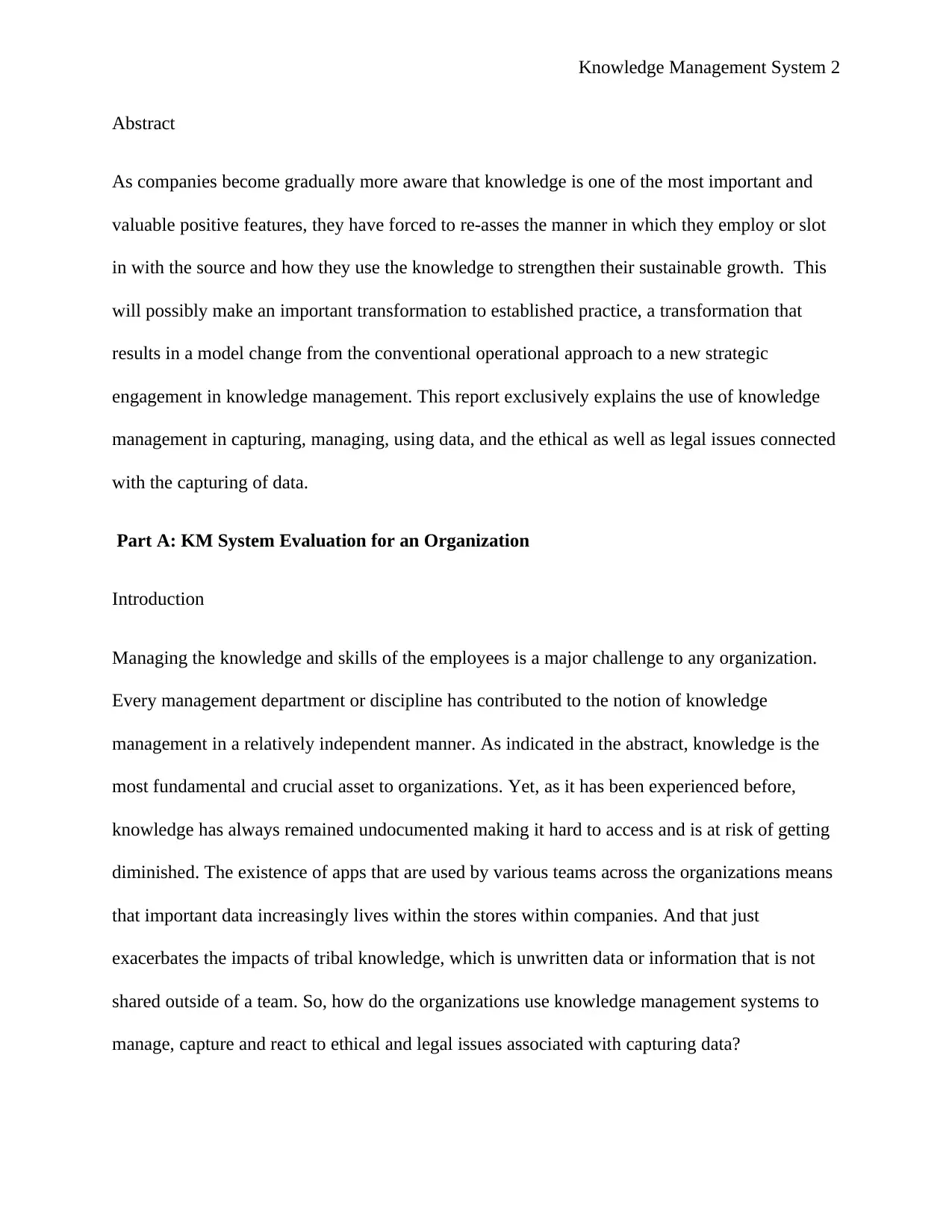
Knowledge Management System 2
Abstract
As companies become gradually more aware that knowledge is one of the most important and
valuable positive features, they have forced to re-asses the manner in which they employ or slot
in with the source and how they use the knowledge to strengthen their sustainable growth. This
will possibly make an important transformation to established practice, a transformation that
results in a model change from the conventional operational approach to a new strategic
engagement in knowledge management. This report exclusively explains the use of knowledge
management in capturing, managing, using data, and the ethical as well as legal issues connected
with the capturing of data.
Part A: KM System Evaluation for an Organization
Introduction
Managing the knowledge and skills of the employees is a major challenge to any organization.
Every management department or discipline has contributed to the notion of knowledge
management in a relatively independent manner. As indicated in the abstract, knowledge is the
most fundamental and crucial asset to organizations. Yet, as it has been experienced before,
knowledge has always remained undocumented making it hard to access and is at risk of getting
diminished. The existence of apps that are used by various teams across the organizations means
that important data increasingly lives within the stores within companies. And that just
exacerbates the impacts of tribal knowledge, which is unwritten data or information that is not
shared outside of a team. So, how do the organizations use knowledge management systems to
manage, capture and react to ethical and legal issues associated with capturing data?
Abstract
As companies become gradually more aware that knowledge is one of the most important and
valuable positive features, they have forced to re-asses the manner in which they employ or slot
in with the source and how they use the knowledge to strengthen their sustainable growth. This
will possibly make an important transformation to established practice, a transformation that
results in a model change from the conventional operational approach to a new strategic
engagement in knowledge management. This report exclusively explains the use of knowledge
management in capturing, managing, using data, and the ethical as well as legal issues connected
with the capturing of data.
Part A: KM System Evaluation for an Organization
Introduction
Managing the knowledge and skills of the employees is a major challenge to any organization.
Every management department or discipline has contributed to the notion of knowledge
management in a relatively independent manner. As indicated in the abstract, knowledge is the
most fundamental and crucial asset to organizations. Yet, as it has been experienced before,
knowledge has always remained undocumented making it hard to access and is at risk of getting
diminished. The existence of apps that are used by various teams across the organizations means
that important data increasingly lives within the stores within companies. And that just
exacerbates the impacts of tribal knowledge, which is unwritten data or information that is not
shared outside of a team. So, how do the organizations use knowledge management systems to
manage, capture and react to ethical and legal issues associated with capturing data?
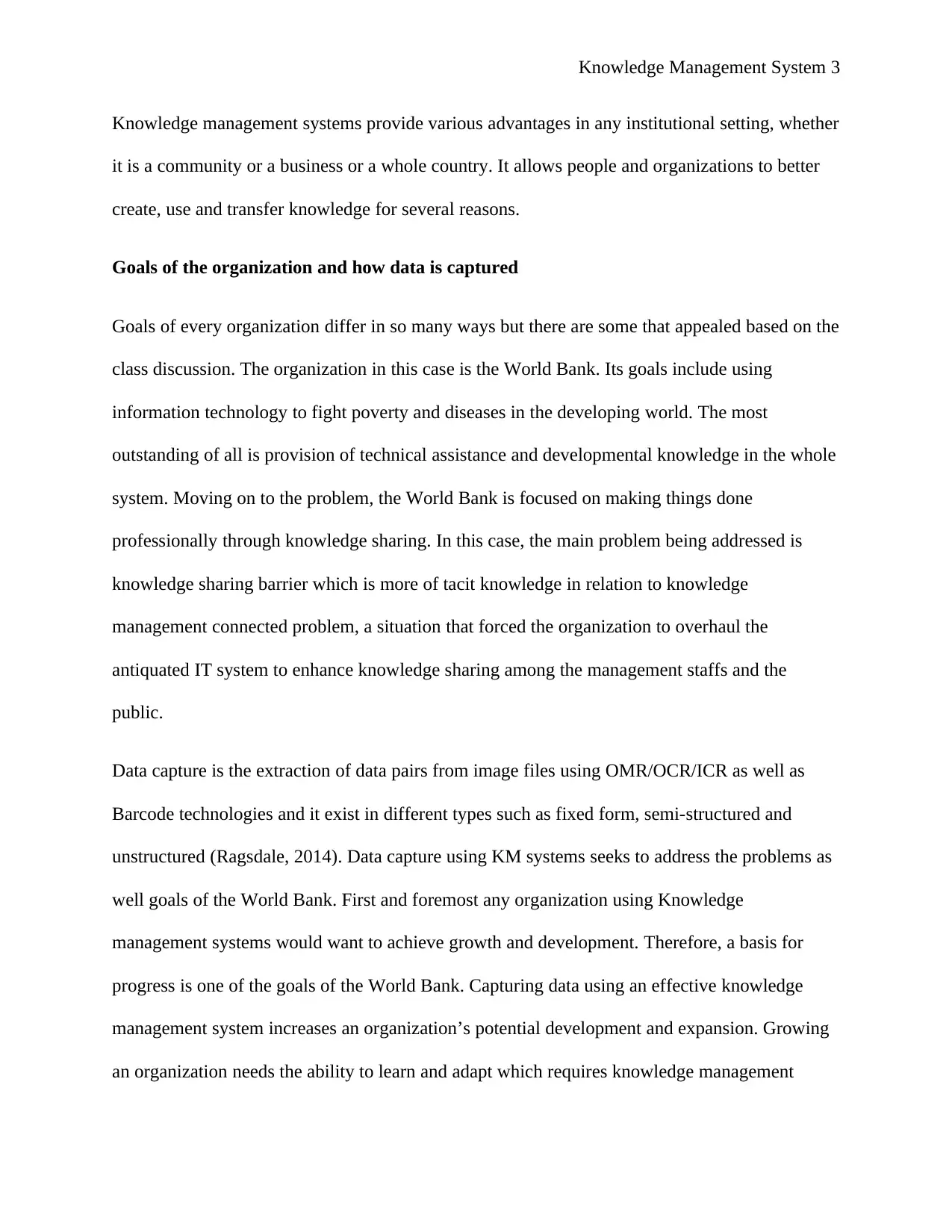
Knowledge Management System 3
Knowledge management systems provide various advantages in any institutional setting, whether
it is a community or a business or a whole country. It allows people and organizations to better
create, use and transfer knowledge for several reasons.
Goals of the organization and how data is captured
Goals of every organization differ in so many ways but there are some that appealed based on the
class discussion. The organization in this case is the World Bank. Its goals include using
information technology to fight poverty and diseases in the developing world. The most
outstanding of all is provision of technical assistance and developmental knowledge in the whole
system. Moving on to the problem, the World Bank is focused on making things done
professionally through knowledge sharing. In this case, the main problem being addressed is
knowledge sharing barrier which is more of tacit knowledge in relation to knowledge
management connected problem, a situation that forced the organization to overhaul the
antiquated IT system to enhance knowledge sharing among the management staffs and the
public.
Data capture is the extraction of data pairs from image files using OMR/OCR/ICR as well as
Barcode technologies and it exist in different types such as fixed form, semi-structured and
unstructured (Ragsdale, 2014). Data capture using KM systems seeks to address the problems as
well goals of the World Bank. First and foremost any organization using Knowledge
management systems would want to achieve growth and development. Therefore, a basis for
progress is one of the goals of the World Bank. Capturing data using an effective knowledge
management system increases an organization’s potential development and expansion. Growing
an organization needs the ability to learn and adapt which requires knowledge management
Knowledge management systems provide various advantages in any institutional setting, whether
it is a community or a business or a whole country. It allows people and organizations to better
create, use and transfer knowledge for several reasons.
Goals of the organization and how data is captured
Goals of every organization differ in so many ways but there are some that appealed based on the
class discussion. The organization in this case is the World Bank. Its goals include using
information technology to fight poverty and diseases in the developing world. The most
outstanding of all is provision of technical assistance and developmental knowledge in the whole
system. Moving on to the problem, the World Bank is focused on making things done
professionally through knowledge sharing. In this case, the main problem being addressed is
knowledge sharing barrier which is more of tacit knowledge in relation to knowledge
management connected problem, a situation that forced the organization to overhaul the
antiquated IT system to enhance knowledge sharing among the management staffs and the
public.
Data capture is the extraction of data pairs from image files using OMR/OCR/ICR as well as
Barcode technologies and it exist in different types such as fixed form, semi-structured and
unstructured (Ragsdale, 2014). Data capture using KM systems seeks to address the problems as
well goals of the World Bank. First and foremost any organization using Knowledge
management systems would want to achieve growth and development. Therefore, a basis for
progress is one of the goals of the World Bank. Capturing data using an effective knowledge
management system increases an organization’s potential development and expansion. Growing
an organization needs the ability to learn and adapt which requires knowledge management
⊘ This is a preview!⊘
Do you want full access?
Subscribe today to unlock all pages.

Trusted by 1+ million students worldwide
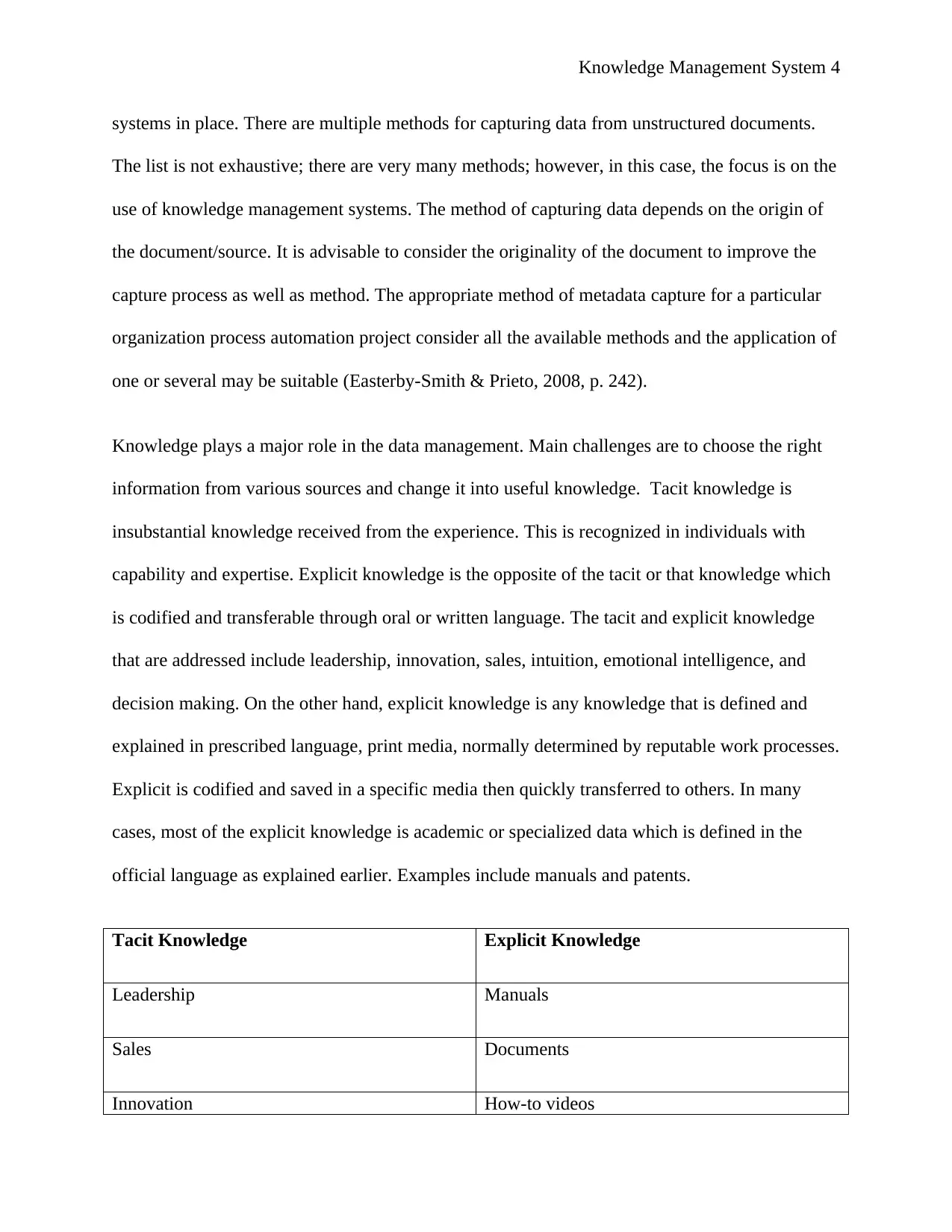
Knowledge Management System 4
systems in place. There are multiple methods for capturing data from unstructured documents.
The list is not exhaustive; there are very many methods; however, in this case, the focus is on the
use of knowledge management systems. The method of capturing data depends on the origin of
the document/source. It is advisable to consider the originality of the document to improve the
capture process as well as method. The appropriate method of metadata capture for a particular
organization process automation project consider all the available methods and the application of
one or several may be suitable (Easterby-Smith & Prieto, 2008, p. 242).
Knowledge plays a major role in the data management. Main challenges are to choose the right
information from various sources and change it into useful knowledge. Tacit knowledge is
insubstantial knowledge received from the experience. This is recognized in individuals with
capability and expertise. Explicit knowledge is the opposite of the tacit or that knowledge which
is codified and transferable through oral or written language. The tacit and explicit knowledge
that are addressed include leadership, innovation, sales, intuition, emotional intelligence, and
decision making. On the other hand, explicit knowledge is any knowledge that is defined and
explained in prescribed language, print media, normally determined by reputable work processes.
Explicit is codified and saved in a specific media then quickly transferred to others. In many
cases, most of the explicit knowledge is academic or specialized data which is defined in the
official language as explained earlier. Examples include manuals and patents.
Tacit Knowledge Explicit Knowledge
Leadership Manuals
Sales Documents
Innovation How-to videos
systems in place. There are multiple methods for capturing data from unstructured documents.
The list is not exhaustive; there are very many methods; however, in this case, the focus is on the
use of knowledge management systems. The method of capturing data depends on the origin of
the document/source. It is advisable to consider the originality of the document to improve the
capture process as well as method. The appropriate method of metadata capture for a particular
organization process automation project consider all the available methods and the application of
one or several may be suitable (Easterby-Smith & Prieto, 2008, p. 242).
Knowledge plays a major role in the data management. Main challenges are to choose the right
information from various sources and change it into useful knowledge. Tacit knowledge is
insubstantial knowledge received from the experience. This is recognized in individuals with
capability and expertise. Explicit knowledge is the opposite of the tacit or that knowledge which
is codified and transferable through oral or written language. The tacit and explicit knowledge
that are addressed include leadership, innovation, sales, intuition, emotional intelligence, and
decision making. On the other hand, explicit knowledge is any knowledge that is defined and
explained in prescribed language, print media, normally determined by reputable work processes.
Explicit is codified and saved in a specific media then quickly transferred to others. In many
cases, most of the explicit knowledge is academic or specialized data which is defined in the
official language as explained earlier. Examples include manuals and patents.
Tacit Knowledge Explicit Knowledge
Leadership Manuals
Sales Documents
Innovation How-to videos
Paraphrase This Document
Need a fresh take? Get an instant paraphrase of this document with our AI Paraphraser
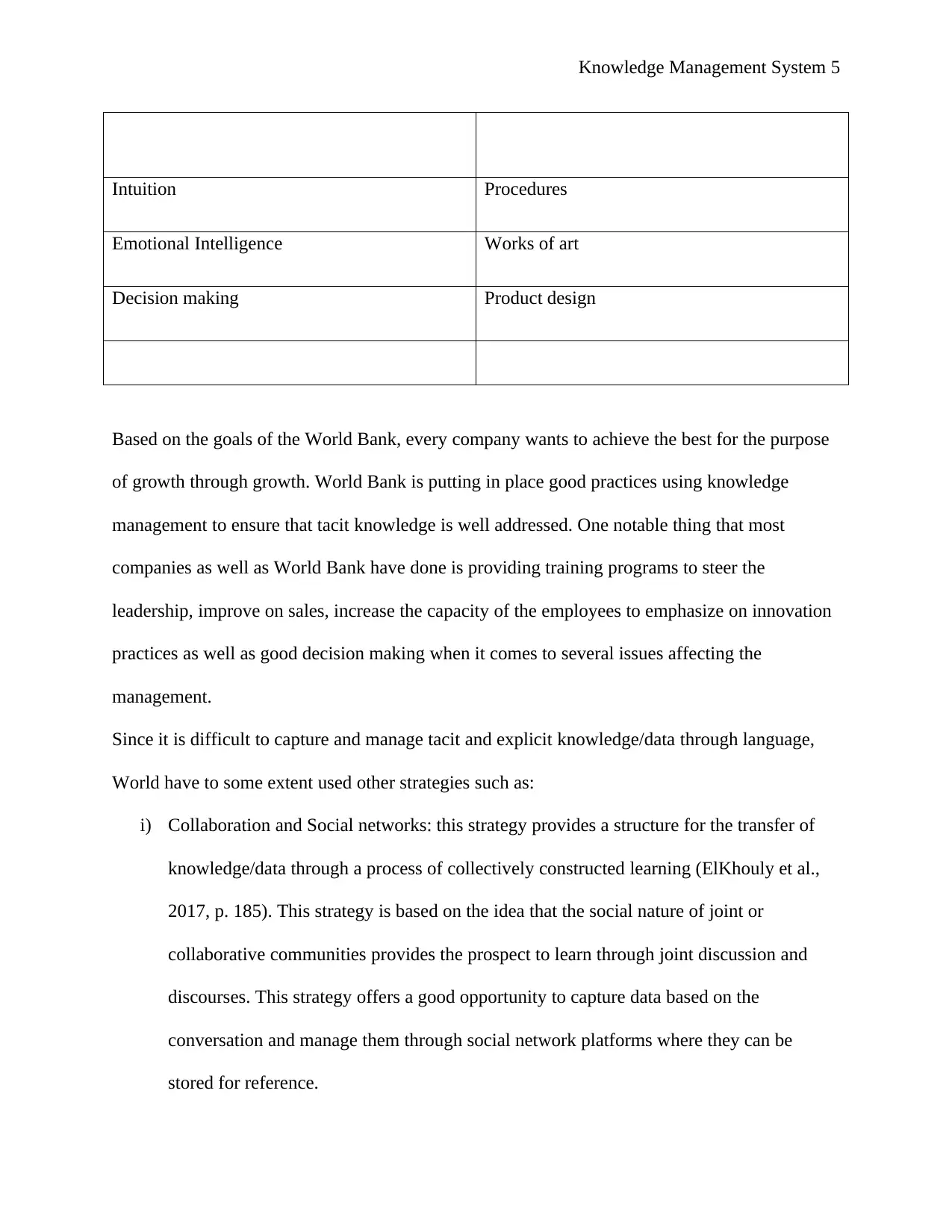
Knowledge Management System 5
Intuition Procedures
Emotional Intelligence Works of art
Decision making Product design
Based on the goals of the World Bank, every company wants to achieve the best for the purpose
of growth through growth. World Bank is putting in place good practices using knowledge
management to ensure that tacit knowledge is well addressed. One notable thing that most
companies as well as World Bank have done is providing training programs to steer the
leadership, improve on sales, increase the capacity of the employees to emphasize on innovation
practices as well as good decision making when it comes to several issues affecting the
management.
Since it is difficult to capture and manage tacit and explicit knowledge/data through language,
World have to some extent used other strategies such as:
i) Collaboration and Social networks: this strategy provides a structure for the transfer of
knowledge/data through a process of collectively constructed learning (ElKhouly et al.,
2017, p. 185). This strategy is based on the idea that the social nature of joint or
collaborative communities provides the prospect to learn through joint discussion and
discourses. This strategy offers a good opportunity to capture data based on the
conversation and manage them through social network platforms where they can be
stored for reference.
Intuition Procedures
Emotional Intelligence Works of art
Decision making Product design
Based on the goals of the World Bank, every company wants to achieve the best for the purpose
of growth through growth. World Bank is putting in place good practices using knowledge
management to ensure that tacit knowledge is well addressed. One notable thing that most
companies as well as World Bank have done is providing training programs to steer the
leadership, improve on sales, increase the capacity of the employees to emphasize on innovation
practices as well as good decision making when it comes to several issues affecting the
management.
Since it is difficult to capture and manage tacit and explicit knowledge/data through language,
World have to some extent used other strategies such as:
i) Collaboration and Social networks: this strategy provides a structure for the transfer of
knowledge/data through a process of collectively constructed learning (ElKhouly et al.,
2017, p. 185). This strategy is based on the idea that the social nature of joint or
collaborative communities provides the prospect to learn through joint discussion and
discourses. This strategy offers a good opportunity to capture data based on the
conversation and manage them through social network platforms where they can be
stored for reference.
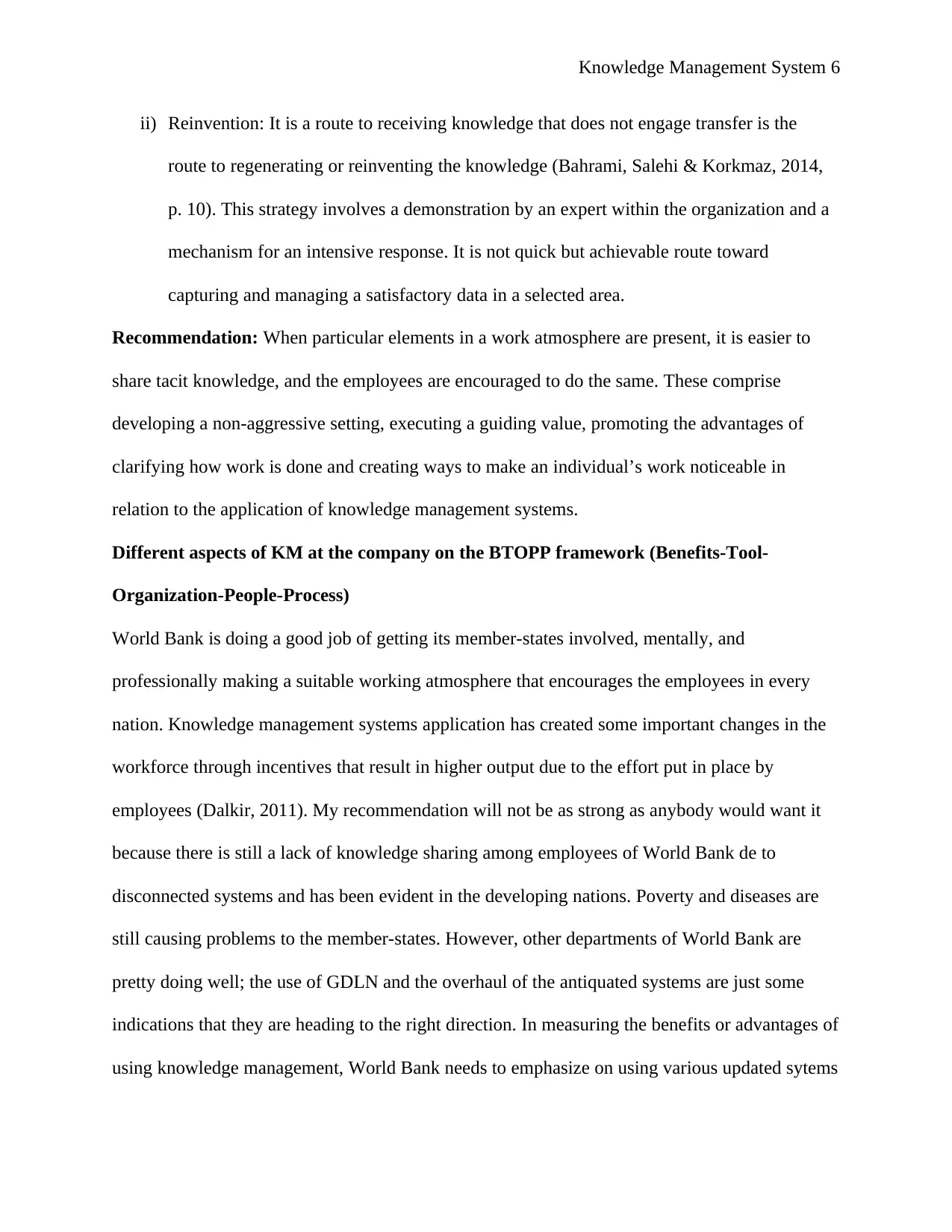
Knowledge Management System 6
ii) Reinvention: It is a route to receiving knowledge that does not engage transfer is the
route to regenerating or reinventing the knowledge (Bahrami, Salehi & Korkmaz, 2014,
p. 10). This strategy involves a demonstration by an expert within the organization and a
mechanism for an intensive response. It is not quick but achievable route toward
capturing and managing a satisfactory data in a selected area.
Recommendation: When particular elements in a work atmosphere are present, it is easier to
share tacit knowledge, and the employees are encouraged to do the same. These comprise
developing a non-aggressive setting, executing a guiding value, promoting the advantages of
clarifying how work is done and creating ways to make an individual’s work noticeable in
relation to the application of knowledge management systems.
Different aspects of KM at the company on the BTOPP framework (Benefits-Tool-
Organization-People-Process)
World Bank is doing a good job of getting its member-states involved, mentally, and
professionally making a suitable working atmosphere that encourages the employees in every
nation. Knowledge management systems application has created some important changes in the
workforce through incentives that result in higher output due to the effort put in place by
employees (Dalkir, 2011). My recommendation will not be as strong as anybody would want it
because there is still a lack of knowledge sharing among employees of World Bank de to
disconnected systems and has been evident in the developing nations. Poverty and diseases are
still causing problems to the member-states. However, other departments of World Bank are
pretty doing well; the use of GDLN and the overhaul of the antiquated systems are just some
indications that they are heading to the right direction. In measuring the benefits or advantages of
using knowledge management, World Bank needs to emphasize on using various updated sytems
ii) Reinvention: It is a route to receiving knowledge that does not engage transfer is the
route to regenerating or reinventing the knowledge (Bahrami, Salehi & Korkmaz, 2014,
p. 10). This strategy involves a demonstration by an expert within the organization and a
mechanism for an intensive response. It is not quick but achievable route toward
capturing and managing a satisfactory data in a selected area.
Recommendation: When particular elements in a work atmosphere are present, it is easier to
share tacit knowledge, and the employees are encouraged to do the same. These comprise
developing a non-aggressive setting, executing a guiding value, promoting the advantages of
clarifying how work is done and creating ways to make an individual’s work noticeable in
relation to the application of knowledge management systems.
Different aspects of KM at the company on the BTOPP framework (Benefits-Tool-
Organization-People-Process)
World Bank is doing a good job of getting its member-states involved, mentally, and
professionally making a suitable working atmosphere that encourages the employees in every
nation. Knowledge management systems application has created some important changes in the
workforce through incentives that result in higher output due to the effort put in place by
employees (Dalkir, 2011). My recommendation will not be as strong as anybody would want it
because there is still a lack of knowledge sharing among employees of World Bank de to
disconnected systems and has been evident in the developing nations. Poverty and diseases are
still causing problems to the member-states. However, other departments of World Bank are
pretty doing well; the use of GDLN and the overhaul of the antiquated systems are just some
indications that they are heading to the right direction. In measuring the benefits or advantages of
using knowledge management, World Bank needs to emphasize on using various updated sytems
⊘ This is a preview!⊘
Do you want full access?
Subscribe today to unlock all pages.

Trusted by 1+ million students worldwide
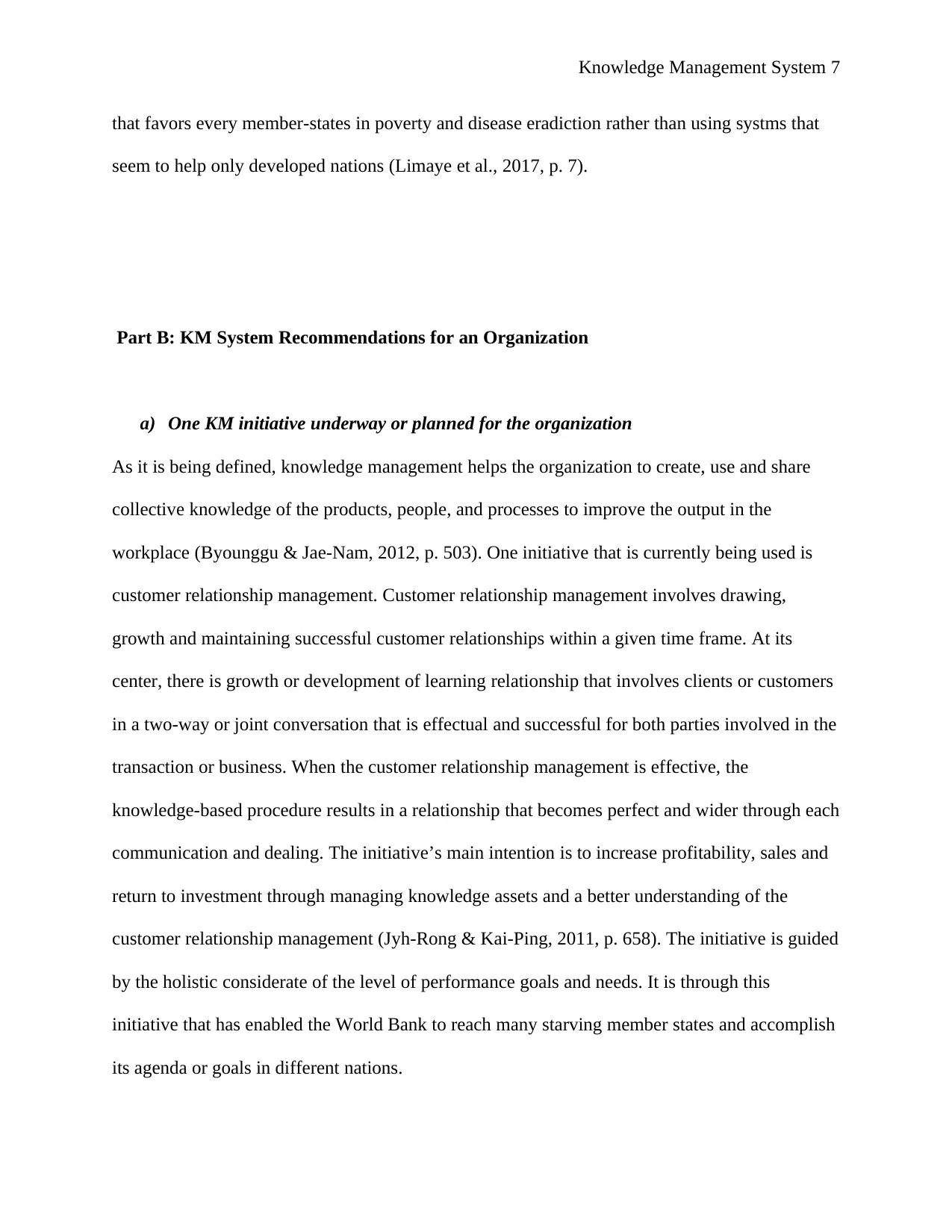
Knowledge Management System 7
that favors every member-states in poverty and disease eradiction rather than using systms that
seem to help only developed nations (Limaye et al., 2017, p. 7).
Part B: KM System Recommendations for an Organization
a) One KM initiative underway or planned for the organization
As it is being defined, knowledge management helps the organization to create, use and share
collective knowledge of the products, people, and processes to improve the output in the
workplace (Byounggu & Jae-Nam, 2012, p. 503). One initiative that is currently being used is
customer relationship management. Customer relationship management involves drawing,
growth and maintaining successful customer relationships within a given time frame. At its
center, there is growth or development of learning relationship that involves clients or customers
in a two-way or joint conversation that is effectual and successful for both parties involved in the
transaction or business. When the customer relationship management is effective, the
knowledge-based procedure results in a relationship that becomes perfect and wider through each
communication and dealing. The initiative’s main intention is to increase profitability, sales and
return to investment through managing knowledge assets and a better understanding of the
customer relationship management (Jyh-Rong & Kai-Ping, 2011, p. 658). The initiative is guided
by the holistic considerate of the level of performance goals and needs. It is through this
initiative that has enabled the World Bank to reach many starving member states and accomplish
its agenda or goals in different nations.
that favors every member-states in poverty and disease eradiction rather than using systms that
seem to help only developed nations (Limaye et al., 2017, p. 7).
Part B: KM System Recommendations for an Organization
a) One KM initiative underway or planned for the organization
As it is being defined, knowledge management helps the organization to create, use and share
collective knowledge of the products, people, and processes to improve the output in the
workplace (Byounggu & Jae-Nam, 2012, p. 503). One initiative that is currently being used is
customer relationship management. Customer relationship management involves drawing,
growth and maintaining successful customer relationships within a given time frame. At its
center, there is growth or development of learning relationship that involves clients or customers
in a two-way or joint conversation that is effectual and successful for both parties involved in the
transaction or business. When the customer relationship management is effective, the
knowledge-based procedure results in a relationship that becomes perfect and wider through each
communication and dealing. The initiative’s main intention is to increase profitability, sales and
return to investment through managing knowledge assets and a better understanding of the
customer relationship management (Jyh-Rong & Kai-Ping, 2011, p. 658). The initiative is guided
by the holistic considerate of the level of performance goals and needs. It is through this
initiative that has enabled the World Bank to reach many starving member states and accomplish
its agenda or goals in different nations.
Paraphrase This Document
Need a fresh take? Get an instant paraphrase of this document with our AI Paraphraser
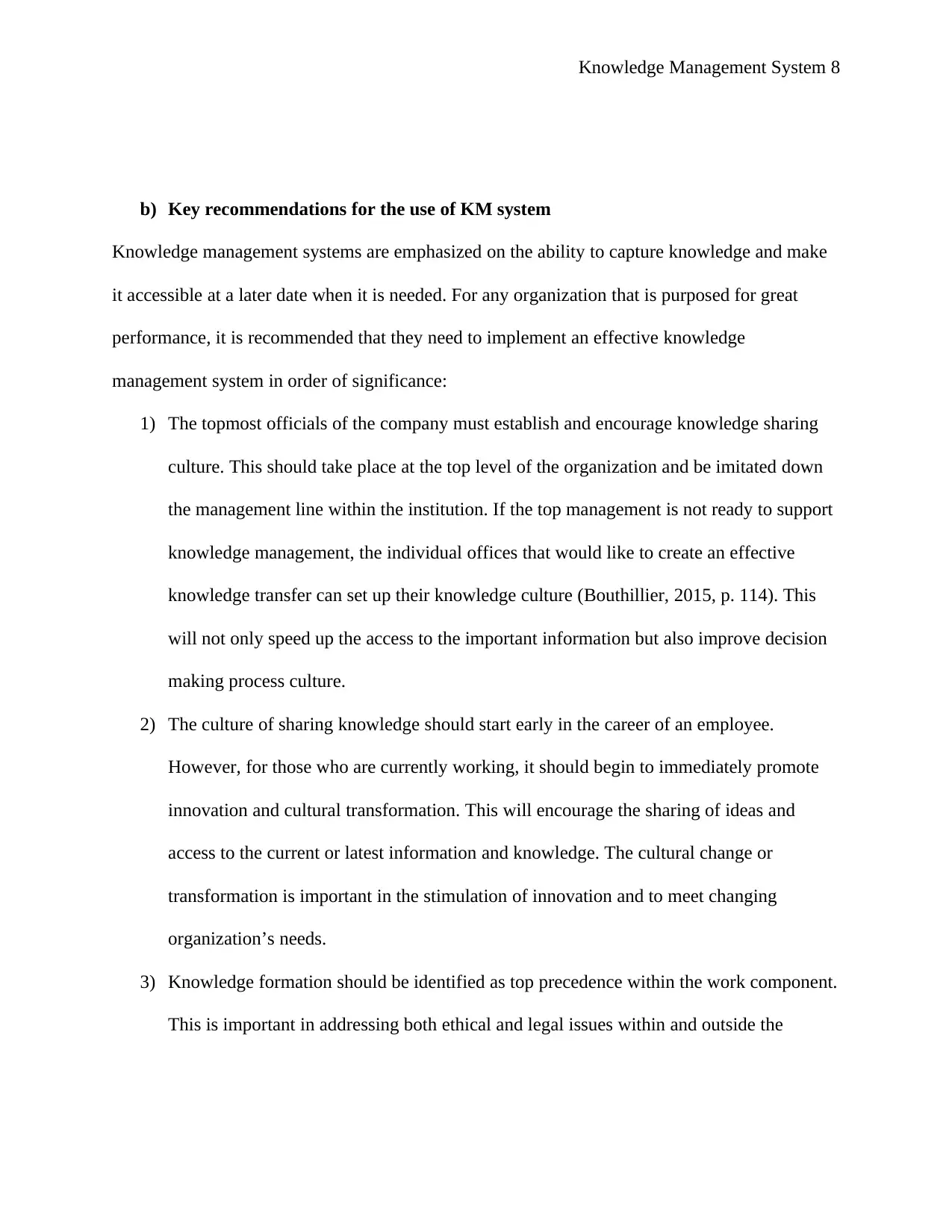
Knowledge Management System 8
b) Key recommendations for the use of KM system
Knowledge management systems are emphasized on the ability to capture knowledge and make
it accessible at a later date when it is needed. For any organization that is purposed for great
performance, it is recommended that they need to implement an effective knowledge
management system in order of significance:
1) The topmost officials of the company must establish and encourage knowledge sharing
culture. This should take place at the top level of the organization and be imitated down
the management line within the institution. If the top management is not ready to support
knowledge management, the individual offices that would like to create an effective
knowledge transfer can set up their knowledge culture (Bouthillier, 2015, p. 114). This
will not only speed up the access to the important information but also improve decision
making process culture.
2) The culture of sharing knowledge should start early in the career of an employee.
However, for those who are currently working, it should begin to immediately promote
innovation and cultural transformation. This will encourage the sharing of ideas and
access to the current or latest information and knowledge. The cultural change or
transformation is important in the stimulation of innovation and to meet changing
organization’s needs.
3) Knowledge formation should be identified as top precedence within the work component.
This is important in addressing both ethical and legal issues within and outside the
b) Key recommendations for the use of KM system
Knowledge management systems are emphasized on the ability to capture knowledge and make
it accessible at a later date when it is needed. For any organization that is purposed for great
performance, it is recommended that they need to implement an effective knowledge
management system in order of significance:
1) The topmost officials of the company must establish and encourage knowledge sharing
culture. This should take place at the top level of the organization and be imitated down
the management line within the institution. If the top management is not ready to support
knowledge management, the individual offices that would like to create an effective
knowledge transfer can set up their knowledge culture (Bouthillier, 2015, p. 114). This
will not only speed up the access to the important information but also improve decision
making process culture.
2) The culture of sharing knowledge should start early in the career of an employee.
However, for those who are currently working, it should begin to immediately promote
innovation and cultural transformation. This will encourage the sharing of ideas and
access to the current or latest information and knowledge. The cultural change or
transformation is important in the stimulation of innovation and to meet changing
organization’s needs.
3) Knowledge formation should be identified as top precedence within the work component.
This is important in addressing both ethical and legal issues within and outside the
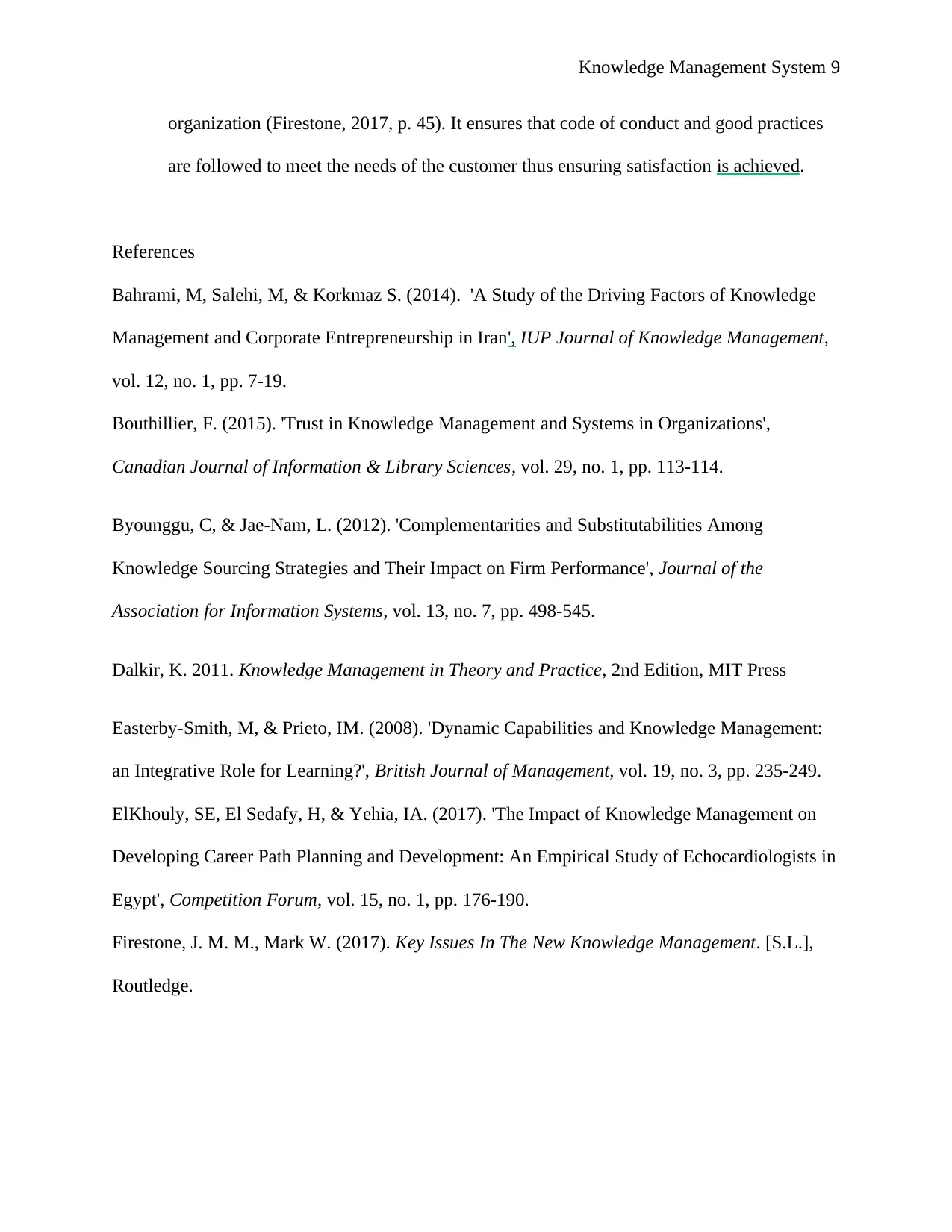
Knowledge Management System 9
organization (Firestone, 2017, p. 45). It ensures that code of conduct and good practices
are followed to meet the needs of the customer thus ensuring satisfaction is achieved.
References
Bahrami, M, Salehi, M, & Korkmaz S. (2014). 'A Study of the Driving Factors of Knowledge
Management and Corporate Entrepreneurship in Iran', IUP Journal of Knowledge Management,
vol. 12, no. 1, pp. 7-19.
Bouthillier, F. (2015). 'Trust in Knowledge Management and Systems in Organizations',
Canadian Journal of Information & Library Sciences, vol. 29, no. 1, pp. 113-114.
Byounggu, C, & Jae-Nam, L. (2012). 'Complementarities and Substitutabilities Among
Knowledge Sourcing Strategies and Their Impact on Firm Performance', Journal of the
Association for Information Systems, vol. 13, no. 7, pp. 498-545.
Dalkir, K. 2011. Knowledge Management in Theory and Practice, 2nd Edition, MIT Press
Easterby-Smith, M, & Prieto, IM. (2008). 'Dynamic Capabilities and Knowledge Management:
an Integrative Role for Learning?', British Journal of Management, vol. 19, no. 3, pp. 235-249.
ElKhouly, SE, El Sedafy, H, & Yehia, IA. (2017). 'The Impact of Knowledge Management on
Developing Career Path Planning and Development: An Empirical Study of Echocardiologists in
Egypt', Competition Forum, vol. 15, no. 1, pp. 176-190.
Firestone, J. M. M., Mark W. (2017). Key Issues In The New Knowledge Management. [S.L.],
Routledge.
organization (Firestone, 2017, p. 45). It ensures that code of conduct and good practices
are followed to meet the needs of the customer thus ensuring satisfaction is achieved.
References
Bahrami, M, Salehi, M, & Korkmaz S. (2014). 'A Study of the Driving Factors of Knowledge
Management and Corporate Entrepreneurship in Iran', IUP Journal of Knowledge Management,
vol. 12, no. 1, pp. 7-19.
Bouthillier, F. (2015). 'Trust in Knowledge Management and Systems in Organizations',
Canadian Journal of Information & Library Sciences, vol. 29, no. 1, pp. 113-114.
Byounggu, C, & Jae-Nam, L. (2012). 'Complementarities and Substitutabilities Among
Knowledge Sourcing Strategies and Their Impact on Firm Performance', Journal of the
Association for Information Systems, vol. 13, no. 7, pp. 498-545.
Dalkir, K. 2011. Knowledge Management in Theory and Practice, 2nd Edition, MIT Press
Easterby-Smith, M, & Prieto, IM. (2008). 'Dynamic Capabilities and Knowledge Management:
an Integrative Role for Learning?', British Journal of Management, vol. 19, no. 3, pp. 235-249.
ElKhouly, SE, El Sedafy, H, & Yehia, IA. (2017). 'The Impact of Knowledge Management on
Developing Career Path Planning and Development: An Empirical Study of Echocardiologists in
Egypt', Competition Forum, vol. 15, no. 1, pp. 176-190.
Firestone, J. M. M., Mark W. (2017). Key Issues In The New Knowledge Management. [S.L.],
Routledge.
⊘ This is a preview!⊘
Do you want full access?
Subscribe today to unlock all pages.

Trusted by 1+ million students worldwide
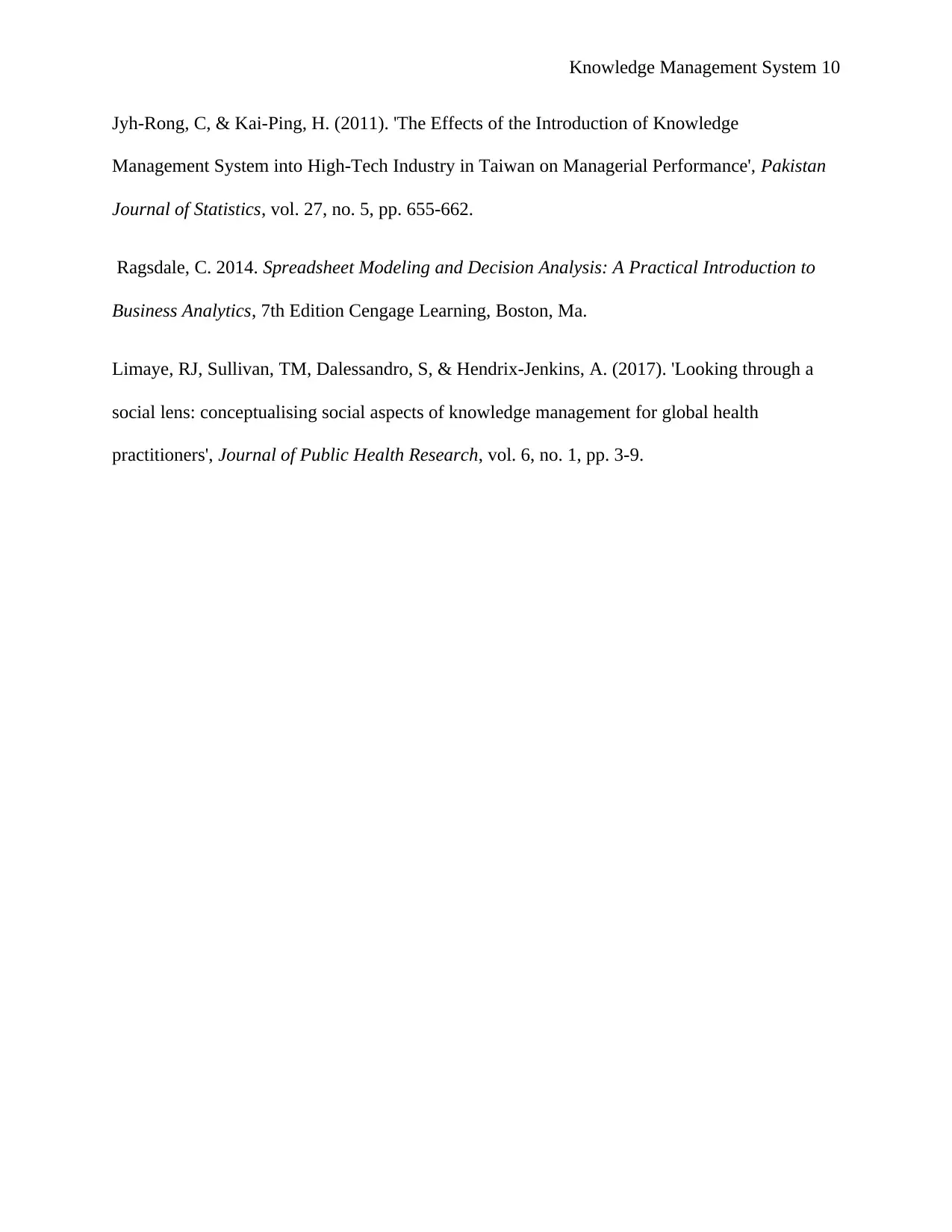
Knowledge Management System 10
Jyh-Rong, C, & Kai-Ping, H. (2011). 'The Effects of the Introduction of Knowledge
Management System into High-Tech Industry in Taiwan on Managerial Performance', Pakistan
Journal of Statistics, vol. 27, no. 5, pp. 655-662.
Ragsdale, C. 2014. Spreadsheet Modeling and Decision Analysis: A Practical Introduction to
Business Analytics, 7th Edition Cengage Learning, Boston, Ma.
Limaye, RJ, Sullivan, TM, Dalessandro, S, & Hendrix-Jenkins, A. (2017). 'Looking through a
social lens: conceptualising social aspects of knowledge management for global health
practitioners', Journal of Public Health Research, vol. 6, no. 1, pp. 3-9.
Jyh-Rong, C, & Kai-Ping, H. (2011). 'The Effects of the Introduction of Knowledge
Management System into High-Tech Industry in Taiwan on Managerial Performance', Pakistan
Journal of Statistics, vol. 27, no. 5, pp. 655-662.
Ragsdale, C. 2014. Spreadsheet Modeling and Decision Analysis: A Practical Introduction to
Business Analytics, 7th Edition Cengage Learning, Boston, Ma.
Limaye, RJ, Sullivan, TM, Dalessandro, S, & Hendrix-Jenkins, A. (2017). 'Looking through a
social lens: conceptualising social aspects of knowledge management for global health
practitioners', Journal of Public Health Research, vol. 6, no. 1, pp. 3-9.
1 out of 10
Related Documents
Your All-in-One AI-Powered Toolkit for Academic Success.
+13062052269
info@desklib.com
Available 24*7 on WhatsApp / Email
![[object Object]](/_next/static/media/star-bottom.7253800d.svg)
Unlock your academic potential
Copyright © 2020–2026 A2Z Services. All Rights Reserved. Developed and managed by ZUCOL.




